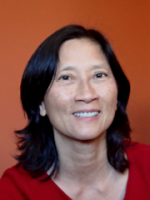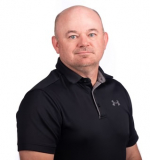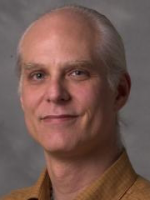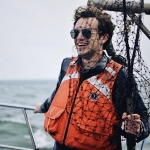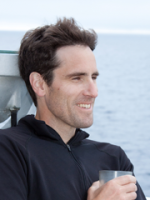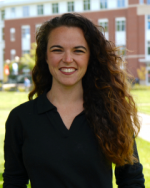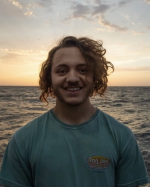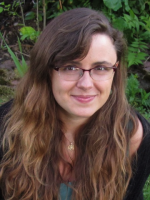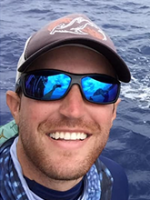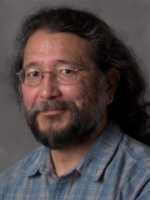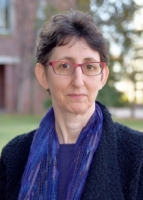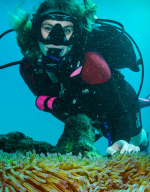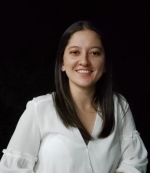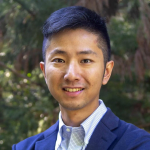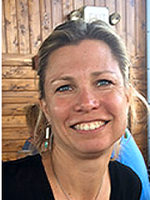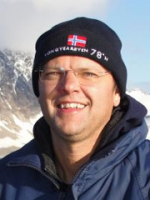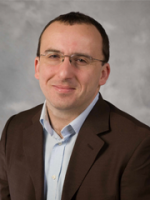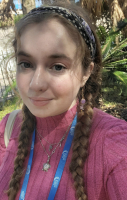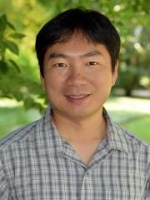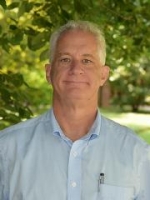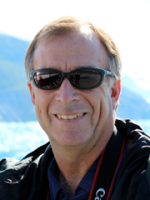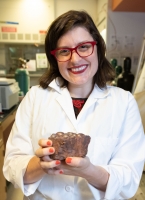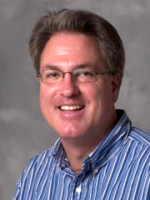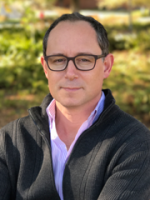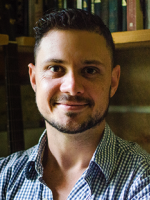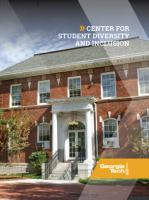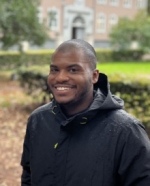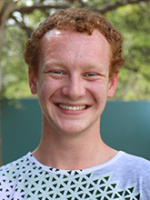Human societies are dependent on natural ecosystem services and biodiversity to provide food, clothing, shelter, medicines, and to purify our air and water and moderate climate, yet the activities of >7 billion humans are changing natural systems in ways that compromise their ability to provide these critical ecosystem services. These changes are not future predictions; they are present realities. This is especially true for ocean ecosystems, which comprise 70% of the Earth’s surface, hold a vast majority of Earth’s live forms, and absorb and buffer many consequences of over harvesting, pollution, habitat destruction, and global change.
Dr. Hay explains the threats to coral reefs
Marine Ecology and Conservation
Many marine and aquatic ecosystems such as coral reefs, marshes, mangroves, rivers, and lakes have degraded to such a degree that they no longer provide the critical ecosystem services upon which both human society and hosts of other species depend. In the face of increasing stresses, the standard approach of simply “conserving” marine species and natural areas is inadequate. Instead, successful stewardship demands that we are able to wisely intervene to cure environmental collapse by using an interdisciplinary merging of insightful marine ecology, effective ecosystem control, and informed policy to “bioengineer” marine ecosystems back to desired states of function and vigor.
Just as biomedical science strives to both prevent and cure disease, informed marine ecologists and engineers must use proven principles to optimize both the conservation and restoration of threatened and impacted ecosystems. To be effective, this demands interdisciplinary approaches, yet most universities, the new knowledge engines, are typically organized according to historical disciplinary boundaries. This must change, and has changed at Georgia Tech – the OSE program is one of several good examples. Solving the most significant ecological and environmental challenges of the future will require the combined efforts, energies, and expertise of groups of marine ecologists, earth and atmospheric scientists, and engineers working productively across the borders of traditional disciplines.
Due to a history of rigorous experimentation, marine ecologists have generated many of the fundamental principles of modern ecology and evolution – these fundamental principles now need to be employed to cure, as well as document, environmental demise.
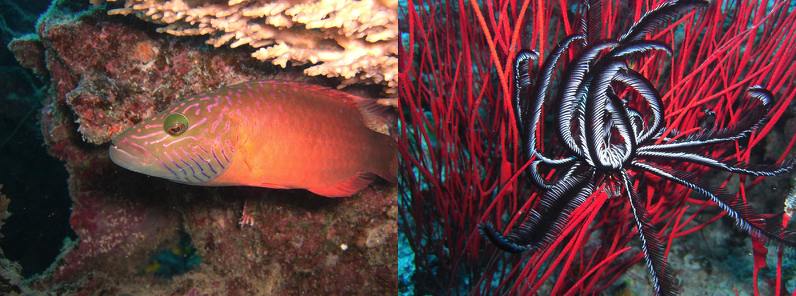
Ocean Microbes
Microorganisms are critical for the health of all ocean ecosystems. Microbes from all three Domains of life occur in every ocean habitat, providing essential services that maintain ecosystem stability and function. These tiny cells, which form the base of the food chain, represent a striking diversity of metabolic and biochemical properties, drive the cycling of ocean carbon, essential nutrients, and climate active gases. As repositories of the overwhelming majority of the ocean's genetic information, microbial cells and viruses play major roles in the evolution of biological innovation and constitute vast resources for biomolecule and drug discovery. Through the consumption and production of a diverse range of metabolites, microbes are also essential mediators of ecological interactions and health outcomes in larger marine organisms.
Research on ocean microbes has been transformed by recent advances in community genomics, chemical quantitation, autonomous ocean sampling and imaging, and the experimental manipulation of systems at the microscale, ushering in a new understanding of the role of ocean microbes in marine systems over a range of spatial and temporal scales. OSE faculty span these disciplines across Schools of Biological Sciences, EAS, Physics, and the College of Engineering, offering students an opportunity for cross-disciplinary training to better understand the vital contributions of microbes to ocean health.
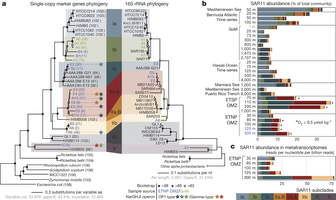 |
"In ocean expanses where oxygen has vanished, newly discovered bacteria are diminishing additional life molecules. They help make virtual dead zones even deader." |
Biogeochemical Cycles
Nitrogen and phosphorus are essential elements to life on Earth. Their transformations in the oceans have an important effect on the carbon cycle and the oceanic food web. With regard to the nitrogen cycle, most reactions are catalyzed by microorganisms. Thus, it is key to determine the rates, pathways, and microbial groups responsible for the transformation of fixed nitrogen or biologically available nitrogen (i.e., NH4+, NO2-, NO3-). As fixed nitrogen often limits production in the world’s oceans, investigations specifically target the microbial processes (denitrification, anammox) responsible for the removal of fixed nitrogen from ecosystems.
With regard to the phosphorus cycle, it is key to understand the role of organic phosphorus compounds that are found ubiquitously in the water column of the oceans. Newly developed electrodialysis-reverse osmosis techniques have allowed researchers to isolate and preconcentrate marine dissolved organic phosphorus (DOP) which is characterized using NMR and various wet chemical techniques. Simultaneously, the accumulation and storage of phosphorus in marine phytoplankton is studied using synchrotron-based x-ray spectromicroscopic techniques.
Finally, iron is a micronutrient that limits primary production in some regions of the oceans, the High Nutrient Low Chlorophyll (HNLC) zones. Predicting the effect of iron limitation on the carbon cycle requires understanding of both oceanic and atmospheric processes such as sediment transport and fluxes, ocean organic ligands and aerosols deposition. By combining models and observations we can quantify how the atmospheric circulation affects iron inputs and primary production in the upper ocean and how sediments coupled to ocean vertical mixing may provide a significant source of iron to sustain primary production in surface waters.
 |
"Polluted Dust Can Impact Ocean Life Thousands of Miles Away, Study Says" |
People in Marine Living Resources
-
OSE Ph.D. Student
 EAS
EAS -
OSE Ph.D. StudentOcean Modeling, Physical Oceanography
 EAS
EAS -
ProfessorChemical Ecology, Marine Zooplankton
 BIOL
BIOL -
ProfessorMicrobial physiology, ecology, virulence, and evolution
 BIO
BIO -
ProfessorMarine Ecology, Chemical Ecology
 BIOL
BIOL -
OSE Ph.D. StudentInvertebrate ecology and behavior, aquatic animal husbandry
 BIOL
BIOL -
OSE Ph.D. StudentPaleoceanography, Isotope Geochemistry
 EAS
EAS -
ProfessorGeochemistry, Coastal Systems
 EAS
EAS -
Adjunct Associate Professor and Associate Professor, Montana State UniversityMicrobiology, Microbial Ecology and Genomics
 BIOL
BIOL -
Assistant ProfessorMarine microbial ecology, coral microbiomes, microbial predators
 BIO
BIO -
Sediment Diagenesis, Biogeochemical Cycling, Climate, Instrument Design, Coastal Systems, Continental Shelf
 EAS
EAS -
OSE Ph.D. StudentMarine Ecology, Chemical Ecology, Marine Zooplankton
 BIOL
BIOL -
OSE Ph.D. Student
 BIOL
BIOL -
OSE Ph.D. StudentMarine Science, Conservation, Engineering, Technology
 EAS
EAS -
Director of OSE, ProfessorBiological Oceanography, Biogeochemical Cycles
 BIOL
BIOL -
OSE GraduatePaleoceanography, Isotope Geochemistry
 EAS
EAS -
Professor, ADVANCE ProfessorPaleooceanography, Isotope Geochemistry
 EAS
EAS -
Microbiology, probiotics, coral, coral disease
 BIO
BIO -
OSE Ph.D. Student
 EAS
EAS -
Assistant ProfessorExperimental fluid mechanics, Turbulence theory, Turbulence in environmental processes
 CEE
CEE -
Professor & Vice President for Interdisciplinary ResearchChemical Biology, Drug Discovery
 BIOL
BIOL -
ProfessorMicrobial Ecology, Biodegradation, Bioremediation
 BIOL
BIOL -
Richard C. Tucker ProfessorMicrobiology, Genomics
 CEE
CEE -
marine biogeochemistry, nutrient cycling, algal blooms
 BIO
BIO -
OSE Ph.D. StudentMicrobiology, Biogeochemistry, Biogeochemical Cycles
 EAS
EAS -
Marine natural products, chemical ecology, marine microbiology
 BIO
BIO -
Professor & Chair of OSE Graduate AdmissionsBiogeochemical Cycles, Ocean and Climate Dynamics
 EAS
EAS -
ProfessorGeochemistry, Biogeochemical Cycles
 EAS
EAS -
Regents ProfessorMarine Ecology, Chemical Ecology
 BIOL
BIOL -
Associate ProfessorMicrobiology, Biogeochemistry, Biogeochemical Cycles
 EAS
EAS -
ProfessorBiogeochemistry, Microbiology
 BIOL
BIOL -
Adjunct Professor & Co-Founder, OSEOcean and Climate Dynamics, Coastal Marine Ecosystems
 EAS
EAS -
OSE Ph.D. StudentMicrobiology, Biological Degradation
 BIOL
BIOL -
Adunct Professor and Professor, Brown UniversityPaleooceanography, Isotope Geochemistry, Climate Dynamics
 EAS
EAS -
Assistant Professorbiogeochemistry, climate, oceanography, paleoclimate
 EAS
EAS -
OSE Ph.D. StudentMarine Natural Products Chemistry & Marine Chemical Ecology
 BIOL
BIOL



